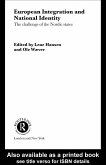This book argues that nationalist violence in developed countries is the product of unresponsive political elites and nationalists blocked from attracting supporters through legal channels. Political elites are prone to ignoring a regional polity when their clout in that region is negligible and they do not rely on the region's support to maintain their positions of power. Conversely, when nationalists cannot make inroads through legal channels, incentives for violence are ripe. Thus, when nationalists in postwar Europe found elites unresponsive, it was state repression that helped radicals build a new group of support around militant action. The larger this new constituency legitimizing violence grew, the longer the conflict lasted. The book elucidates this complex dynamic through a deft combination of theoretical modeling, statistical methods and comparative case studies from the Basque Country, Catalonia, Corsica, Northern Ireland, Sardinia and Wales.
Dieser Download kann aus rechtlichen Gründen nur mit Rechnungsadresse in A, B, BG, CY, CZ, D, DK, EW, E, FIN, F, GR, HR, H, IRL, I, LT, L, LR, M, NL, PL, P, R, S, SLO, SK ausgeliefert werden.









